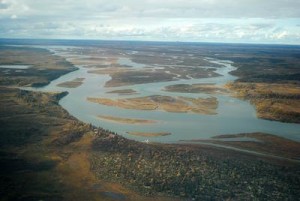Pulling a classic Friday afternoon document drop, the Environmental Protection Agency (EPA) released its revised draft Bristol Bay Watershed Assessment on Friday afternoon – only two days after tamping down media expectations that the release was imminent.
As American Resources President Daniel McGroarty pointed out in an email to journalists on Friday, the flawed assessment draws from research conducted by Stratus Consulting and Ann Maest, the firm’s managing scientist, both of which earlier this month admitted to having falsified research in a long-running high profile environmental lawsuit against energy company Chevron.
The Daily Caller’s Michael Bastasch has covered the story.
As Bastasch explains,
“Maest and Stratus claimed earlier this month that they had been misled by a plaintiffs’ lawyer when they provided an environmental report detailing the damage done by Chevron subsidiary Texaco to areas of Ecuador. They disavowed the report as ‘tainted.’
“The environmental impact report used against Chevron was supposed to be written by an independent expert, but was instead written by Stratus, which was employed by lawyers representing Ecuadorian villagers.”
These trial lawyers, according to Stratus, demanded that the assessment be ghost-written by Stratus and Maest to appear as if written by Richard Cabrera, the court-appointed expert, and that Stratus’s involvement be kept secret.
Upon admitting to falsifying the report Stratus released a statement saying:
“Stratus believes that the damages assessment in the Cabrera Report and the entire Cabrera process were fatally tainted and are not reliable. Stratus disavows the Cabrera Report, has agreed to cooperate fully and to provide testimony about the Ecuador litigation.”
As Bastasch points out,
“The company’s involvement in the Chevron case does not appear to have dampened the EPA’s willingness to work with Stratus. The regulator’s review of the Pebble Mine cites Maest’s work in conjunction with Stratus seven times. The review also cites Maest’s work in conjunction with consulting firm Buka Environmental four times.”
The plot thickens when you consider that even before the Cabrera report admission, Maest had done consultancy work for anti-mining groups. One such group, CSP2, has stated on its website that Maest and a colleague at Stratus Consulting have provided technical assistance on geochemistry and hydrology for CSP2’s work in support of a coalition opposing the Pebble mine in Alaska.
Consequently, American Resources principal Daniel McGroarty has called for the EPA to “withdraw Maest’s research from the assessment and conduct a thorough review of any and all work Stratus Consulting has done for EPA.”
Beyond relying on discredited researchers, the assessment is still seriously flawed, as it merely evaluates a hypothetical project as no formal plans have been submitted, leading Pebble LP, a venture by Northern Dynasty Minerals and Anglo American PLC, to repeat its call for “due process,” which Greenwire’s Manuel Quinones translates as “shorthand for the ability to go through the permitting process.” (subscription required)
Quinones cites Pebble CEO John Shively who argues:
“At a time when the entire executive branch is having to cut important program funding because of sequestration, it is stunning that the EPA continues to pursue this matter instead of waiting for a permit application to review through the well-established regulatory process.”
However, considering the EPA’s recent history of regulatory overreach – West Virginia’s Spruce Mine being a case in point – there is little hope the agency will change its ways.





